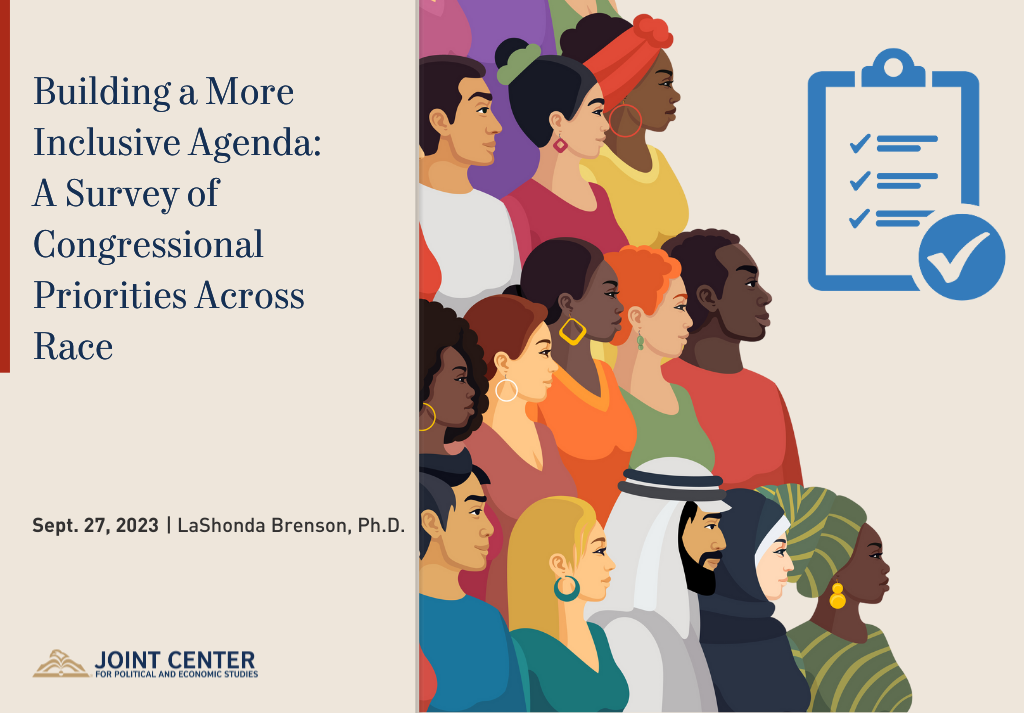Data for Black America

Congressional Top Priorities: Passing Legislation to Ensure Americans Have the Right to Vote is Respondents’ Top Priority
As the 118th Congress enters the last months of the year, it faces a number of pressing priorities. Right now, members of Congress seek to confirm presidential appointees and pass a federal budget. These more urgent priorities lie alongside other longer term policy goals such as increasing wages, protecting online privacy and security, and reforming the tax code.
Given the various important policy priorities before the 118th Congress, the Joint Center for Political and Economic Studies sought to learn what Americans across race and ethnicity believe should be top priorities for members of Congress. This 118th Congress represents the most racially and ethnically diverse populace America has ever seen. About 25 percent of the voting members of Congress identify as people of color.1 As of July 1, 2022, 41.1 percent of Americans identify as people of color.
To this end, the Joint Center and NORC at the University of Chicago partnered to field a survey with responses from over 1,200 Americans. The data was collected online from January 26 to 30, 2023, using NORC’s probability-based AmeriSpeak panel.2
The Joint Center and NORC at the University of Chicago surveyed Americans across race and ethnicity to understand the importance of priorities for members of Congress. Respondents were asked to rate several issues as a top priority, an important but lower priority, not too important a priority, or something that should not be done.
Over half (52 percent) of all respondents felt that making sure that every American has the right to vote should be a top priority for members of Congress, making it the top priority of all policy issues surveyed. Other items ranked highly as top priorities include increasing the federal minimum wage of $7.25 an hour (49 percent), ensuring that employers pay wages that keep up with the cost of necessities (49 percent), and reducing the federal deficit (48 percent support). Contrastingly, only 15 percent say the same about regulating companies’ use of technology to make decisions about job interviews and loans and passing legislation to take away funding from the Internal Revenue Service (IRS) being a top priority for Congress.
Passing Legislation to Ensure Americans Have the Right to Vote is Respondents’ Top Priority; Passing Legislation to Take Away Funding from the IRS is Among the Lowest
Across racial groups, the ranking of top policy priorities varies. The top priority for Black and Asian-Pacific Islander, multiracial, other non-Hispanic respondents was ensuring that employers pay wages that keep up with the cost of living. A similar economic issue, increasing the federal minimum wage of $7.25 an hour, was ranked by Latina/os as a top priority. The top priority for white respondents was passing legislation to ensure every American has a right to vote.
For 18 of the 20 (90 percent) policy priorities asked about on the survey, at least half of respondents say each should be a top priority or that it is an important but lower priority. Only 34 percent of respondents say that passing legislation to take away funding from the IRS should be a top priority or that it is an important but lower priority. Only 43 percent of respondents say that regulating companies' use of technology to make decisions about job interviews and loans should be a top priority or that it is an important but lower priority.
This blog post is a part of a series under our Data for Black America Project. Forthcoming blog posts will analyze survey data related to respondents’ attitudes towards racial equity, jobs and skills training, tax policy, and regulating technology policy.
Methodology
The Joint Center for Political and Economic Studies and NORC at the University of Chicago staff collaborated on this study. NORC fielded the survey using its AmeriSpeak® panel. Interviews for this survey were conducted between January 26, 2023 and January 30, 2023. The survey included 1,231 adults across the country. The margin of sampling error is +/- 4.2 percentage points at the 95 percent confidence level among all adults. The Omnibus survey is administered in mixed mode; (online) web (CAWI) and phone (CATI). About 90 percent of the interviews and conducted online and about 10 percent are conducted by phone.
Funded and operated by NORC at the University of Chicago, AmeriSpeak® is a probability-based panel designed to be representative of the US household population. Randomly selected US households are sampled using area probability and address-based sampling, with a known, non-zero probability of selection from the NORC National Sample Frame. These sampled households are then contacted by US mail, telephone, and field interviewers (face to face). The panel provides sample coverage of approximately 97 percent of the U.S. household population. Those excluded from the sample include people with P.O. Box only addresses, some addresses not listed in the USPS Delivery Sequence File, and some newly constructed dwellings. While most AmeriSpeak households participate in surveys by web, non-internet households can participate in AmeriSpeak surveys by telephone. Households without conventional internet access but having web access via smartphones are allowed to participate in AmeriSpeak surveys by web. AmeriSpeak panelists participate in NORC studies or studies conducted by NORC on behalf of governmental agencies, academic researchers, and media and commercial organizations. For more information, email AmeriSpeak-BD@norc.org or visit AmeriSpeak.norc.org.
1 Katherine Schaefer, “U.S. Congress continues to grow in racial, ethnic diversity,” Pew Research Center, January 9, 2023.
2 AmeriSpeak is a probability-based panel, with households selected from a documented sample list (technically called a “sample frame”). Randomly selected households are sampled with a known, non-zero probability of selection from the NORC National Frame and address-based sample, and then contacted by U.S. mail and by NORC telephone and field interviewers.

